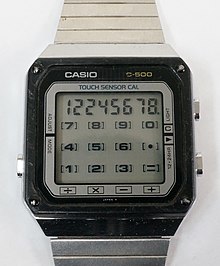
Back Horlosie AF ساعة يد Arabic Èrluji tangan BEW হাতঘড়ি Bengali/Bangla Eurier BR Rellotge (complement) Catalan Chiū-biēu CDO کاتژمێری دەستی CKB Hodinky Czech Oriawr CY

A watch is a portable timepiece intended to be carried or worn by a person. It is designed to keep a consistent movement despite the motions caused by the person's activities. A wristwatch is designed to be worn around the wrist, attached by a watch strap or other type of bracelet, including metal bands, leather straps, or any other kind of bracelet. A pocket watch is designed for a person to carry in a pocket, often attached to a chain. A stopwatch is a watch that measures intervals of time.
Watches appeared in the 16th century. During most of its history, the watch was a mechanical device, driven by clockwork, powered by winding a mainspring, and keeping time with an oscillating balance wheel. These are called mechanical watches.[1][2]

In the 1960s the electronic quartz watch was invented, which was powered by a battery and kept time with a vibrating quartz crystal. By the 1980s the quartz watch had taken over most of the market from the mechanical watch. Historically, this is called the quartz revolution (also known as the quartz crisis in Switzerland).[3][4]
Developments in the 2010s include smart watches, which are elaborate computer-like electronic devices designed to be worn on a wrist. They generally incorporate timekeeping functions, but these are only a small subset of the smartwatch's facilities.
In general, modern watches often display the day, date, month, and year. For mechanical watches, various extra features called "complications", such as moon-phase displays and the different types of tourbillon, are sometimes included. Most electronic quartz watches, on the other hand, include time-related features such as timers, chronographs, and alarm functions. Furthermore, some modern watches (like smart watches) even incorporate calculators, GPS[5] and Bluetooth technology or have heart-rate monitoring capabilities, and some of them use radio clock technology to regularly correct the time.
Most watches that are used mainly for timekeeping have quartz movements. However, expensive collectible watches, valued more for their elaborate craftsmanship, aesthetic appeal, and glamorous design than for simple timekeeping, often have traditional mechanical movements, despite being less accurate and more expensive than their electronic counterparts.[3][4][6] As of 2018, the most expensive watch ever sold at auction was the Patek Philippe Henry Graves Supercomplication, the world's most complicated mechanical watch until 1989, fetching US$24 million (CHF 23,237,000) in Geneva on 11 November 2014.[7][8][9][10][11] As of December 2019, the most expensive watch ever sold at auction (and wristwatch) was the Patek Philippe Grandmaster Chime Ref. 6300A-010, fetching US$31.19 million (CHF 31,000,000) in Geneva on 9 November 2019.[12]
- ^ "CWorld | Christopher Ward | QUARTZ VS AUTOMATIC". www.christopherward.com. Archived from the original on 27 November 2018. Retrieved 27 November 2018.
- ^ "What is a Watch Movement? Quartz vs Automatic vs Manual vs Kinetic | Est.1897". est1897.co.uk. Archived from the original on 27 November 2018. Retrieved 27 November 2018.
- ^ a b "Four Revolutions: Part 1: A Concise History Of The Quartz Revolution - HODINKEE". HODINKEE. Archived from the original on 30 May 2019. Retrieved 27 November 2018.
- ^ a b "A Concise History of the Quartz Watch Revolution". Bloomberg.com. 16 November 2017. Archived from the original on 27 November 2018. Retrieved 27 November 2018.
- ^ "Epson announces world's lightest GPS watch". The Verge. 21 February 2012. Archived from the original on 26 April 2012. Retrieved 14 April 2012.
- ^ "Mechanical Watches Almost Disappeared Forever. Here's How They Didn't". Bloomberg.com. 4 January 2018. Archived from the original on 18 November 2018. Retrieved 27 November 2018.
- ^ "Patek Philippe (THE HENRY GRAVES JR. SUPERCOMPLICATION)". Sotheby's. Archived from the original on 24 September 2015. Retrieved 27 November 2018.
- ^ Adams, Ariel. "$24,000,000 Patek Philippe Supercomplication Pocket Watch Beats Its Own Record at Auction". Forbes. Archived from the original on 23 November 2018. Retrieved 23 November 2018.
- ^ "Swiss Pocket Watch Sells for Record $24 Million". Time. Retrieved 23 November 2018.
- ^ "Patek Philippe gold watch sells for record $24.4M - CNN". CNN Style. 12 November 2014. Archived from the original on 23 November 2018. Retrieved 23 November 2018.
- ^ "World's most expensive watch sold". BBC News. Archived from the original on 23 November 2018. Retrieved 24 November 2018.
- ^ Kahle, Laurie (11 November 2019). "Patek Philippe's $31 Million Grandmaster Chime Becomes Most Expensive Watch Ever Sold". Barrons. Archived from the original on 17 July 2020. Retrieved 17 July 2020.